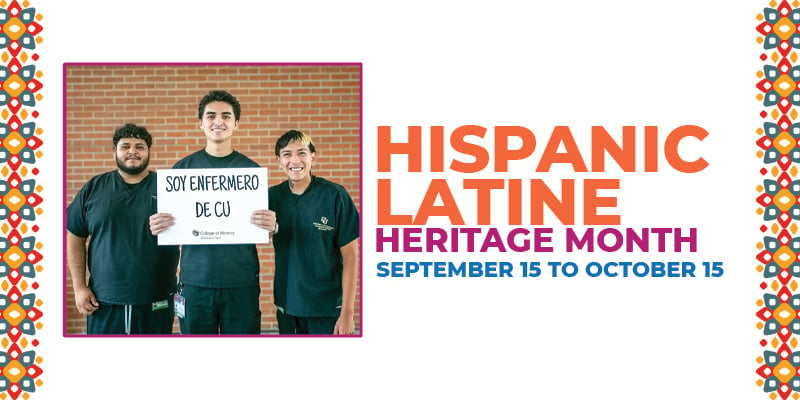Earning a BS in Nursing degree is hard. So is making friends in your first year of college. When you combine the two, it can be difficult to find the right group of people to become your friends.
That wasn’t a problem for students Raudel Garcia Hernandez, Steven Martinez-Torres, and Alexander Valdez. The three met in the first weeks of the Traditional (TRAD) BS in Nursing program at the University of Colorado College of Nursing at Anschutz Medical Campus.
“We saw each other every day, and eventually we became friends,” Valdez says. “We kept saying hi to each other, and Raudel and Steven stood out because we’re some of the only guys in the TRAD program.”
Forming a Friendship
The three formed a bond after struggling in their pathophysiology class and quickly realized they found their gente (people in Spanish).
“You don’t have to necessarily be from a Hispanic or Latine background to call people your gente,” Martinez-Torres says. “Gente means people you feel comfortable around and people who help you flourish. It’s an environment you create with people.”
“It’s more about building relationships – it’s not always family,” Valdez says. “Your gente are people who help bring out the best qualities in you.
“We have a lot of expectations going through this program, and it’s a lot of work. It’s so worth it at the end of the day, but it’s great knowing these guys are here. I can tell them I did really bad on a test, and I can talk about my feelings with them, and that goes a long way,” he adds.
While the three have bonded over studying, classes, and clinicals, they also talk about things outside of class.
“I like the culture we all share,” Garcia Hernandez says. “Sometimes you need that break and talk about other things on my mind, and I feel like I can’t do that with other people who don’t have a similar background to me. I feel more comfortable with them.”
Shared Experiences
Garcia Hernandez, Martinez-Torres, and Valdez grew up in Colorado. They’ve seen first-hand the health disparities facing the state’s Hispanic community. Martinez-Torres translated for his parents during doctor’s appointments. Garcia Hernandez says there’s a lot of mistrust in the Hispanic community – including within his family – when it comes to healthcare, causing some people to put off seeking treatment.
“I want to be an inspiration for other Latinos in my community because a lot of them don’t have access to healthcare,” Garcia Hernandez says. “There’s a lot of misbeliefs about healthcare in the Latino community – some think it’s a scam or won’t get help until the last minute. I want that to go away and want people to actually reach out for help.”
“It’s important to have Hispanic and Latino nurses because there are some patients who only speak Spanish,” Martinez-Torres says. “And when they know you speak Spanish, you can see them ease up and become more comfortable because they can relate to you.”
First-Generation Students
Garcia Hernandez, Martinez-Torres, and Valdez are the first in their families to go into the medical field – something rare in the Hispanic and Latine communities.
“I never met a Latino nurse until my first clinical a few weeks ago,” Martinez-Torres says. “We have a big Spanish-speaking population, and it’s important to have that representation.”
“I think it’s cool to know that other people can make it as a nurse, and I think that is a really big thing for me. It shows that I can do this too,” Valdez says. “Even if you don’t have the same resources compared to other communities, becoming a nurse is still a possibility. You can show others it’s doable.”
Garcia Hernandez’s family works mostly in construction and acknowledges his family said higher education wasn’t a possibility for him.
“That’s what really pushed me. I said no, I want to be different. I want to change our family, and I want to be a role model for future generations of our family,” he says. “Don’t let the big campus scare you – don’t let the college classes scare you. You can be something good, and you can do something great. As long as that’s your mindset, anything can be possible.”



